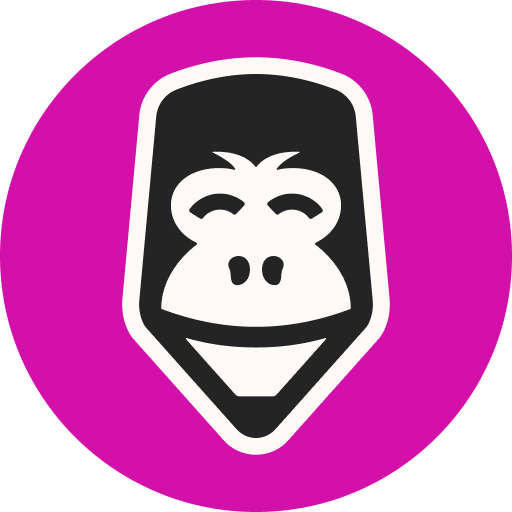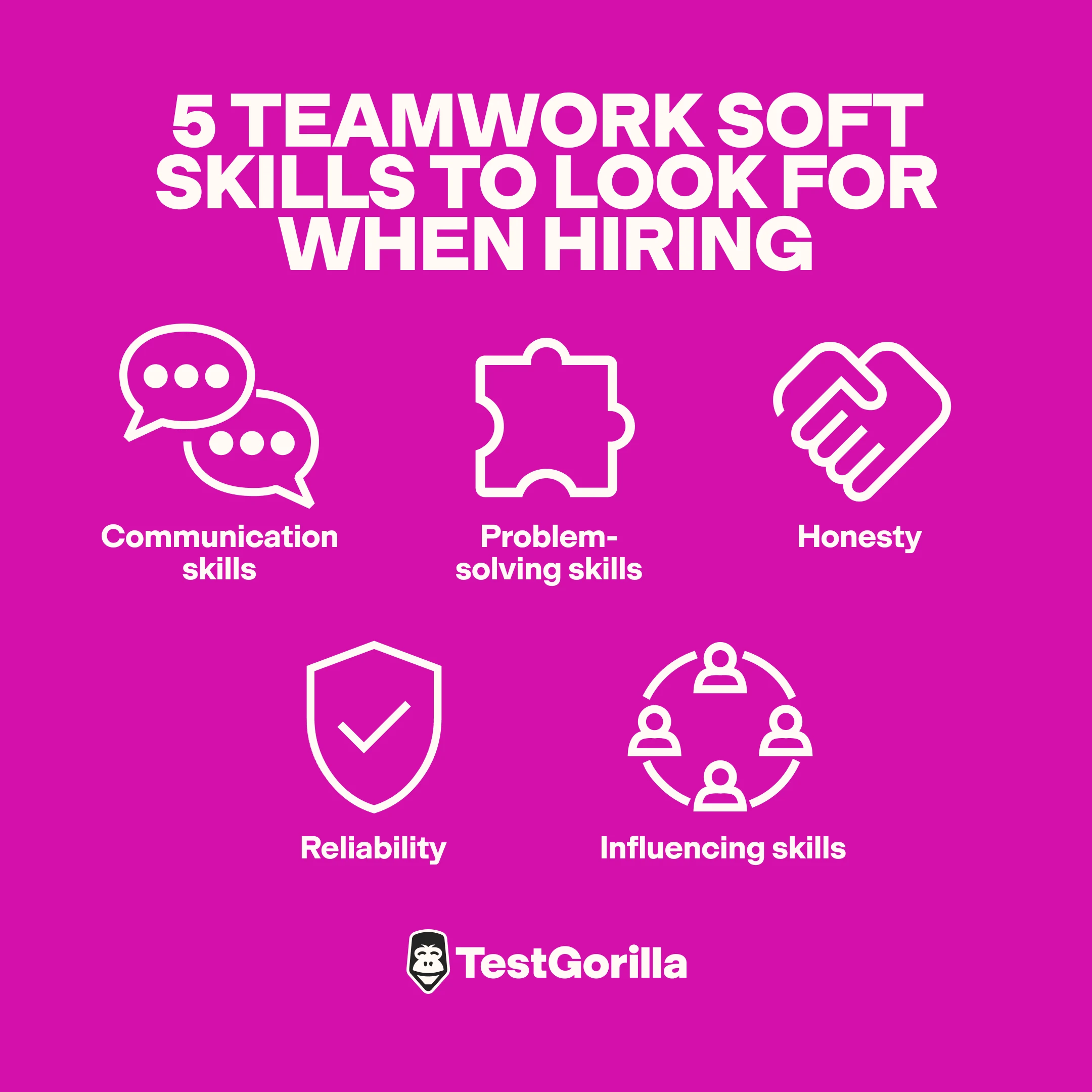Being a team player is one of the most underrated traits in modern workplaces. However, strong teamwork skills aren’t easy to teach. They’re usually an amalgamation of different soft skills like communication, honesty, and problem-solving. These qualities help candidates build strong interpersonal relationships, navigate workplace challenges, and contribute to a positive team dynamic.
In this article, we look at the five most important teamwork soft skills. We explain why they’re important, what to look out for in candidates, and, crucially, how to measure them.
What are teamwork soft skills?
Teamwork soft skills are interpersonal and collaborative human skills like communication, prioritization, adaptability, emotional intelligence, and problem-solving that help individuals work well in a group. These soft skills are essential for fostering a productive and harmonious working environment, enabling teams to operate more effectively, achieve mutual goals, and keep projects on track.
5 teamwork soft skills to look out for when hiring
Look for the following soft skills when seeking candidates to join a team environment.
1. Communication skills
Effective communication is the bread and butter of good teamwork. Employees need to be strong verbal, non-verbal, and written communicators, as well as have active listening skills and the ability to adapt their communication style to different audiences.
However, this level of flexibility isn’t easy, so looking for people who can explain things clearly, pick up on unspoken cues, and adjust their approach depending on who they’re talking to is important. You can do this by asking behavioral-style soft-skill interview questions and requesting real-life examples of how candidates navigate difficult conversations.
Adapting communication styles to meet stakeholder needs is a crucial skill in the workplace, and it’s often what separates a good candidate from a great one.
2. Problem-solving skills
Problem-solving is a crucial teamwork skill that sits at the intersection of hard and soft skills. It shows the ability to take inventory of challenges quickly, think critically, and devise a practical solution.
Problem-solving is a skill that can be taught and improved upon, so it’s difficult to say it’s a hard and fast soft skill. However, what makes it so valuable in a team setting is how it enables team members to approach challenges with a creative and solutions-oriented mindset.
You can measure problem-solving by presenting candidates with hypothetical problems and asking how they might tackle them. This approach means candidates must think on their feet, evidencing their creativity and critical thinking skills.
3. Honesty
In a world where 47% of workers admit to telling up to five lies a day, honesty is one of the most important but undervalued soft skills. Candidates need to be able to hold their hands up when they make a mistake, act with integrity when facing difficult decisions, and provide transparent and constructive feedback to team members.
Honest feedback doesn’t mean being overly critical or unkind. It’s a delicate balance that candidates will need to find to succeed in the workplace. You can measure this soft skill by using behavioral-style interview questions, asking candidates to give an example of a time they’ve had to deliver difficult feedback or when they made a mistake and how they handled it.
An honest candidate will be able to grow relationships quickly within your business. Your current employees will pick up on their integrity, and trust will naturally develop.
4. Reliability
Nobody likes a flake, and reliability is a key skill in building workplace relationships and ensuring team cohesion. Like trust, reliability is built over time, meaning it can’t be faked or rushed.
A reliable candidate is someone you can count on to meet deadlines, work towards a common goal, follow through on commitments, and be present when needed. They take ownership of their work and are dependable, which helps the entire team function more smoothly.
To assess reliability, you can ask candidates for examples of times when they’ve had to manage multiple tasks or meet tight deadlines and how they ensured timely completion. A reliable person will share how they plan, prioritize, and stay organized to avoid letting things slip.
5. Influencing skills
Applicants need to be able to influence stakeholders of all levels in a way that’s respectful and effective. It’s about presenting ideas clearly, persuading stakeholders through logic, and building alignment without forcing their hand.
This knack for positioning strategic information correctly takes practice and awareness. Strong influencing skills can be learned, but they’re considered soft skills as they rely heavily on communication, emotional intelligence, and understanding human behavior.
You can measure how well your candidates understand this by asking them to share a time they influenced a senior leader to develop their leadership skills or had to persuade their team in some way. The level of detail offered will give you insights into how strategic their approach was, indicating their current skill level and where there’s still room to grow.
The best insights on HR and recruitment, delivered to your inbox.
Biweekly updates. No spam. Unsubscribe any time.
How to measure teamwork soft skills when hiring
There are a few ways you can measure teamwork soft skills when hiring.
1. Behavioral-style interview questions
Behavioral-style interview questions are the most effective way to gain insight into a candidate’s thought process and experience. These questions usually start with:
“Tell me about a time you…”
“How would you approach the following scenario…”
“Explain to me how…”
Using these prompts encourages candidates to recall how they dealt with situations in the past and how they would apply that experience to future encounters. These questions are great for spotting transferable skills in candidates from different industries or departments.
2. Pre-employment testing
Pre-employment testing is another solid way to test candidates’ teamwork soft skills. You can use a talent discovery platform, like TestGorilla, to uncover communication styles, problem-solving skills, and personality types. Taking a skills-based approach will help you understand how candidates interact with your current team and where they may bring value.
TestGorilla’s library of 400+ tests means you’ve got plenty of options to find the right fit for your team. Consider incorporating the following tests into a custom assessment:
Communication
Problem-solving
Active listening
Leadership and people management
Time management
3. Self-reflection exercise
Another valuable tool is the self-reflection exercise. Ask your candidates pre-interview to score themselves against a number of set criteria. For example, how well they handle feedback, their presentation skills, or how empathic they are.
Discuss the exercise at the interview and ask candidates to give real-world examples that reflect their scores. This is great for measuring soft skills that may otherwise be difficult to quantify. For example, honesty and reliability.
You can then compare these skills to the core competencies you’re looking for. This exercise not only helps you see how candidates perceive and give practical evidence of their own abilities but also highlights any potential gaps or strengths that might not be clear from a resume.
Use TestGorilla to identify the ideal candidate for your team
Teamwork soft skills are crucial but critically undervalued. They encompass all skills that relate to how candidates work and interact with others, like communication, honesty, reliability, and more. Soft skills are difficult to teach, so a candidate who inherently has them should be at the top of your list.
You can measure soft skills through behavioral-style interview questions, self-reflection exercises, and pre-employment testing. A talent discovery platform like TestGorilla makes this easy, offering a range of tests to help you measure an applicant’s skills.
Sign up for your free trial today and see the difference TestGorilla can make to your hiring process.
Related posts
You've scrolled this far
Why not try TestGorilla for free, and see what happens when you put skills first.















